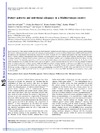Identificador persistente para citar o vincular este elemento:
https://accedacris.ulpgc.es/jspui/handle/10553/24514
| Título: | Dietary patterns and nutritional adequacy in a Mediterranean country | Autores/as: | Serra-Majem, Lluis Bes-Rastrollo, Maira Román Viñas, Blanca Pfrimer, Karina Sánchez-Villegas, Almudena Martínez-González, Miguel Ángel |
Clasificación UNESCO: | 3206 Ciencias de la nutrición 32 Ciencias médicas |
Palabras clave: | Dietary patterns Factor analysis Probability approach Nutrient adequacy Mediterranean diet, et al. |
Fecha de publicación: | 2009 | Proyectos: | Red Alimentación Saludable en la Prevención Primaria de Enfermedades Crónicas: la Red Predimed. (Retics 2006) | Publicación seriada: | British Journal of Nutrition | Resumen: | Dietary patterns have been related to health outcomes and morbi-mortality. Mediterranean diet indexes are correlated with adequate nutrient intake. The objective of the present study was to analyse the adequacy of nutrient intake of a posteriori defined Mediterranean (MDP) and Western (WDP) diet patterns in the Seguimiento Universidad de Navarra (SUN) cohort. A sample of 17197 subjects participated in the study. Participants completed a 136-item validated semi-quantitative FFQ. Principal component analysis was used to define dietary patterns. Individuals were classified according to quintiles of adherence based on dietary pattern scores. Non-dietary variables, such as smoking and physical activity habits, were also taken into account. The probability approach was used to assess nutrient intake adequacy of certain vitamins (vitamins B12, B6, B3, B2, B1, A, C, D and E) and minerals (Na, Zn, iodine, Se, folic acid, P, Mg, K, Fe and Ca). Logistic regression analysis was used to assess the adequacy of nutrient intake according to adherence to dietary patterns. WDP and MDP were defined. A higher quintile of adherence to an MDP was associated to a lower prevalence of inadequacy for the intake of Zn, iodine, vitamin E, Mg, Fe, vitamin B1, vitamin A, Se, vitamin C and folic acid. The adjusted OR for not reaching at least six (or at least ten) nutrient recommendations were 009 (95% CI: 007, 011) (and 002 (95% CI: 000, 016)) for the upper quintile of MDP and 44 (95% CI: 36, 55) and 25 (95% CI: 11, 54) for the WDP. The MDP was associated to a better profile of nutrient intake. | URI: | https://accedacris.ulpgc.es/handle/10553/24514 | ISSN: | 0007-1145 | DOI: | 10.1017/S0007114509990559 | Fuente: | British Journal of Nutrition [ISSN 0007-1145] v. 101 (Suppl. 2), p. S21-S28, (Julio 2009) | Derechos: | by-nc-nd |
| Colección: | Artículos |
Citas SCOPUSTM
113
actualizado el 08-jun-2025
Citas de WEB OF SCIENCETM
Citations
99
actualizado el 08-feb-2026
Visitas
118
actualizado el 10-ene-2026
Descargas
176
actualizado el 10-ene-2026
Google ScholarTM
Verifica
Altmetric
Comparte
Exporta metadatos
Los elementos en ULPGC accedaCRIS están protegidos por derechos de autor con todos los derechos reservados, a menos que se indique lo contrario.
